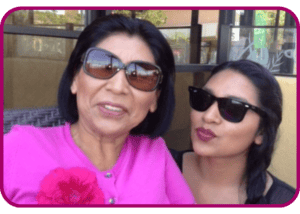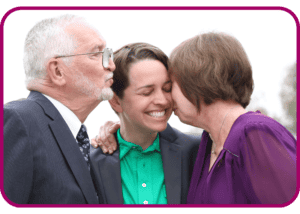LA Voice Celebrates Mothers Day
In honor of Mother’s Day, LA Voice’s Director of Organizing, Yvonne Figueroa, and Clergy and Formation Lead, Rabbi Jocee Hudson, remember their moms and the impact they had on their organizing and their lives.
Yvonne: My mom was born in a small pueblo in El Salvador in 1957. She started working at an early age to help my grandmother, who was a single mother raising four children. Wanting to leave the poverty, fear, and violence of the civil war behind, she emigrated to the San Fernando Valley in 1987. We grew up in Section 8 housing in Pacoima and although it was a small space for a family of eight, it was affordable.
I remember having a realization at LA Voice that tenant and anti-poverty movements like the ones we were in paved the way for policies that made it possible for my family to survive. My mom had a 6th grade education so the only kind of jobs she could get were low wage. Having worked in a sewing factory and a hotel she eventually settled into home care through a county-funded In-Home Supportive Services program. My mom was one of the hardest working individuals I know. Apart from her paid labor, she took care of the home — cooking, cleaning, volunteering at her church, and taking care of elderly members. She modeled for me service, deep faith, and a hard work ethic. She also had a lot of anger, and sadness. She wanted a different life for us, she encouraged us to go to college, she believed that would be our only way out of poverty.

She grew up in LA before Proposition 13, so her public schools were well-funded and public transportation was easy to access. While she faced sexism and misogyny in the workforce, she also broke through glass ceilings and paved the way for many women who came behind her. When I was growing up, I saw how my parents centered our family’s life around Shabbat dinners. My mom served for many years as our synagogue’s president and taught high school students in our religious school.
“I had always thought of my mom’s story as one of personal grit and perseverance. But, more than that, her life story is one that was rooted in a social safety net that has since disappeared.”
Yvonne: One of the stories I will always remember about my mom is when she would take us to visit elderly community folk who needed support. One woman we visited who we called “Mariyita.” She couldn’t walk, had no family in the states, and rented a back room in a house. When we would visit her, my mom would take her bags of groceries, make her food, clean her room, give her money, and run any other errands for her. Equally as important, she would pray with her, encourage her, and be a healing presence for her. There is research that says that poor people are more charitable than the rich. My mom was just this person, she would always say that we needed to support those who were even more vulnerable than us. What a gift to have seen this kind of love through service.
Jocee: One of the stories I will always remember about my mom is from my years of elementary school, when there were no parents available to serve as my Girl Scout Troop’s leader. When it seemed that the troop would fold without someone to step up, my mom volunteered and, for years, without complaint, she left home once a week at 4:30am, so that she could be at the office by 5:30am, and back to my school by 2:30pm, ready to lead us in songs and activities. Today, I look back on this story, which I probably would have once titled as “Sacrifice,” as being a story of “Sacrifice and Privilege.” My mom had the kind of job that let her make her own hours.
“There is research that says that poor people are more charitable than the rich. My mom was just this person, she would always say that we needed to support those who were even more vulnerable than us. What a gift to have seen this kind of love through service.”

Yvonne Figueroa and her mother.
Yvonne: My mom was diagnosed with Multiple Myeloma my last year at California State College Long Beach. She didn’t tell me. She feared that if I knew, I would put my degree on hold. One rainy and stormy afternoon, my sister told me while we were out for lunch. She couldn’t bear the weight of the secret. I was devastated and confused and angry. I never confronted her about it, her health just declined and she could no longer hide it. She was too sick to be there for my graduation. I was heartbroken.
One of the biggest reasons I did well in school and in college was because of her encouragement and her desire for me to be a “professional.” Underlying, I intuitively knew that she wanted us to have choices and economic freedom. She passed away in 2014, just two months after I graduated. In 2015, I started organizing with SEIU 2015, California’s largest home care worker’s union, of which my mom was a member through IHSS. I was supporting and fighting alongside ladies like my mom for increased wages and better benefits. That fight was personal.

Rabbi Jocee Hudson and her parents.
Jocee: My mom was diagnosed with Metastatic Melanoma in 2009 and she died five years later, on August 14, 2014. In her last years, my mom went back to school and earned a PhD in Leadership. She was 64 years-old and I was in the third trimester of my first pregnancy. In her last days, my mom placed her hand on my belly and felt my daughter, Sela, kick inside me.
My dad and I were holding her hands as she took her last breaths and I like to believe that a piece of my mom’s soul entered through me and into my daughter in those last moments.
Yvonne: I learned from my mom the power of faith. Believing that all our needs were going to be met before they materialized. I saw her pray hard, with gratitude, with radical belief, with hope, and sometimes with despair and tears in her eyes. Organizing is hard and it requires a lot of faith and radical belief that anything is possible. This image of her praying still carries me forward when the work feels too heavy.
Jocee: My mom lived her life with the value of justice at the center. I did not always agree with her choices, but I was unwavering in my belief in her morals. I know that if she were alive today, she would be with us in our Home is Sacred fight. Steadfast in her belief that housing is a human right and that all of us should be afforded the same opportunities she was.
I was taught long ago not to overthink a gift from the universe. My mom’s presence in my life – her voice in my head, her spirit in my children, and her moral courage pulsing through me – are some of the most treasured of my possessions.
